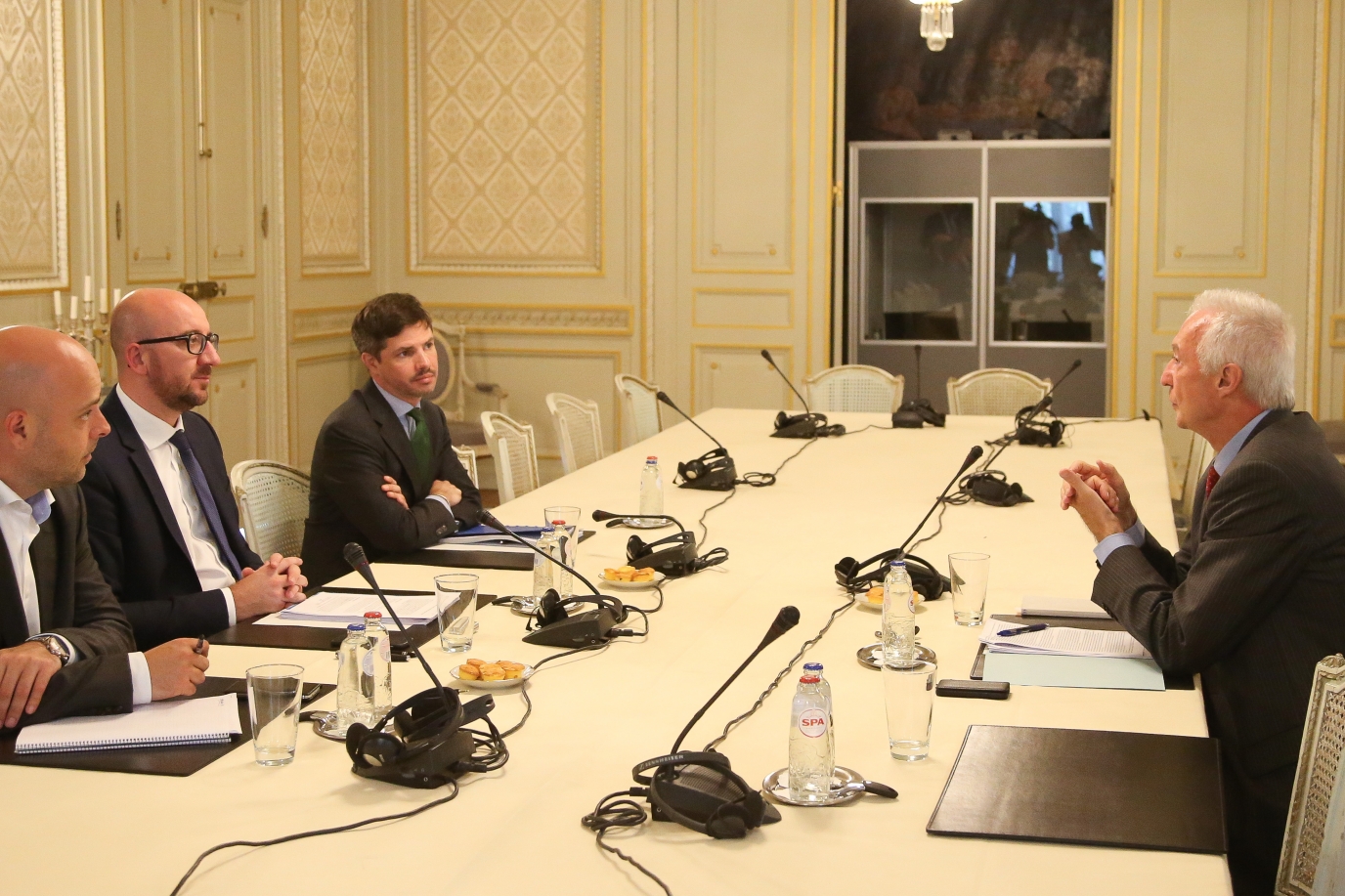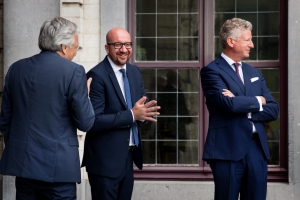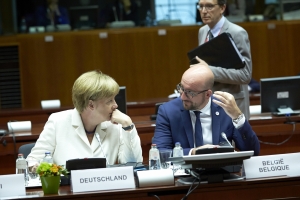Attacks in Tunisia: the Prime Minister mobilises the Government to combat terrorism
 ©Belga
©BelgaCharles Michel had a meeting this afternoon with Gilles de Kerchove, the European Anti-Terrorism Coordinator. The Prime Minister discussed the question of European expertise against the background of a global approach to tackling terrorism, including the need to prevent radicalisation. Charles Michel, who had a meeting with the Tunisian Prime Minister a month ago, endorsed the call for support in fighting terrorism and radicalism.
Constant efforts
In view of the attacks committed in France, Tunisia and Kuwait, last Friday, the Prime Minister has taken several measures, while intensifying contacts with the different security services.
On Friday afternoon, Charles Michel called an emergency meeting of the Strategic Intelligence and Security Committee to make a review of the information available in the wake of the attacks and take security measures. Consequently, it was agreed to tighten up the protective measures for the SEVESO sites in Belgium and certain potential targets.
This weekend, Charles Michel also had contacts with his British counterpart, David Cameron. In addition to Belgian citizens, the victims of the terrorist attack in Sousse also included people from the United Kingdom. The two men agreed to take initiatives to step up European ant-terrorism cooperation. Towards this end, contacts will be made with the Tunisian authorities with a view to offering them support and assistance.
Specific commitments.
On the basis of a proposal by the Budget Minister, Hervé Jamar, the Belgian Government last week released roughly €40 million for security measures, as planned during the budgetary review. Hervé Jamar, the Budget Minister, said: "I believe it is important to clearly earmark a specific budget for investment measures intended to improve the security of our citizens. In spite of the difficult budgetary situation, the fight against terrorism continues to be a top priority."
The Deputy Prime Minister, Security and Home Affairs Minister, Jan Jambon, commented: "Security is the government's main task. In my capacity as Security Minister, my duty is to ensure that the security services actually receive the human and material resources they need for the effective fulfilment of their task. This is particularly true in the case of our fight against terrorism. This investment represents a first positive signal. Other investment efforts will be made in the coming weeks and months".
Koen Geens, Justice Minister: “The additional resources I have asked for, in my capacity as Minister responsible for Justice, State Security and Integrated Policing, the Federal Prosecutor's Office and Prisons, are of crucial importance in the fight against terrorism. A high percentage of the investment is earmarked for the technological equipment the services need to pursue their targets more quickly and monitor their activities. Again today, an international commission to examine witnesses has left to carry out investigations in Tunisia. A magistrate from the Federal Prosecutor's Office and two members of the Federal Criminal Police are members of the Commission".
Here are a few examples of the investment measures agreed upon by the Government.
- Protecting Jewish community sites: €4 million
- State security: €539K
- Bullet-proof vests for Royal Palaces Security Detachment: €61.5K
- Equipment for new Belgian State Security operational staff (weapons, magazines, cases, holster,…): €52.4K
- Equipment for specialist Belgian State Security personnel (earpieces/radios/camera lenses,…): €99.1K
- Acquisition of Belgian State Security rolling stock: €440K
- Belgian State Security Astrid radio equipment: €140K
- Armoured vehicles for foreign posts (Jerusalem, Bujumbura, Amman and Niamey): €560K
- Additional security for foreign posts (temporary back-ups required for Istanbul, Ankara, Tunis, Paris, Niamey, Islamabad, Amman, Ouagadougou, Bamako, Nairobi, Bujumbura): €1,136K
- Equipment for special units (daytime eyewear for snipers/ snipers/ night vision/ Tasers/semi-automatic weapons/ grenade launcher/handguns/bombkiller/Simon grenades/Ammunition): €1,976K
- Equipment for special units (shields, helmets, heavy ballistic body protectors, gas masks, aerial bombs,...): €2,878K
- Intelligence gathering equipment (DSU): €3,803K
- 3D scanner and drone for Federal Criminal Police in Brussels: €169.4K
Subsequent to the attack in Paris, in January, and the anti-terrorist operations undertaken, particularly in Verviers, the Government brought forward its anti-terrorism and radicalism plan. A series of 12 measures have been implemented by the Ministers responsible for Home Affairs and Security, Jan Jambon, and Justice, Koen Geens. Most of the measures are being applied or will be in the coming weeks.
- Adding to the Criminal Code a new terrorist offence concerning travelling abroad for terrorist purposes.
The text is designed to step up the fight against terrorism by bringing charges against those travelling abroad or arriving in Belgium for the purpose of committing terrorist offences. Example: the attack on the Jewish Museum in Brussels showed that terrorist- related travel is dangerous not only when this involves people leaving Belgian territory but also those travelling to Belgium, such as a person of Belgian origin or otherwise who has been staying in Syria.
- Extending the list of offences leading to the use of specific investigation methods (art. 90b of the Code of Criminal Procedure)
This article seeks to authorise eavesdropping, the examination and recording of private communications and telecommunications, for a) terrorist offences (activities of public provocation to commit terrorist offences, recruitment for terrorism and training for terrorism) and b) those who travel abroad or arrive in Belgium to commit a terrorist offence.
- Extending the opportunities for withdrawing nationality.
The withdrawal of Belgian nationality will henceforth be possible for any terrorist offences.
- Temporary withdrawal of an identity card, refusal to issue and withdrawal of passports.
The bill is aimed at providing a means of refusing to issue an identity card to a Belgian citizen and to withdraw or invalidate the card (if physical withdrawal is impossible). An identity card can be used to travel (without the need for a passport) to and from certain foreign countries.
- Reform of the National Security Council's intelligence and security structures
Chaired by the Prime Minister, the new NSC includes the Ministers responsible for Justice, National Defence, Home and Foreign Affairs, and the Deputy Prime Ministers whose jurisdictions do not cover these matters. The latest NSC meeting was held on 26 May.
- Activate the mechanism provided by law for identifying people who are involved in the funding of terrorism and whose assets will be frozen
- Revision of the 25 September 2014 "Foreign Fighters" circular
This circular concerns the management of information and follow-up measures for “Foreign Fighters” residing in Belgium.
- Exchange of information. Optimum sharing of information between the authorities and the administrative and judicial departments.
- Revision of the R Plan. The revision of the 2005 anti-radicalisation plan is being speeded up to take account of recent developments.
Coordinated by the Threat Assessment Coordination Body (OCAM), the Radicalism Plan is classified as confidential pursuant to the Law of 11 December 1998.
- Combating radicalism in the prison environment.
Koen Geens Justice Plan.
- Deploying the army for specific surveillance activities.
- Reinforcing State Security capabilities and transferring VIP protection duties to the federal police authorities
Work has started on transferring State Security protection assistants to the federal police authorities, as provided for in the government agreement.
Measures 1, 2, 3, 4 and 12 have been forwarded to be voted on shortly by the Parliament. Measures 5, 10 and 11 have been implemented. Measures 6, 7, 8 and 9 are being finalised.


